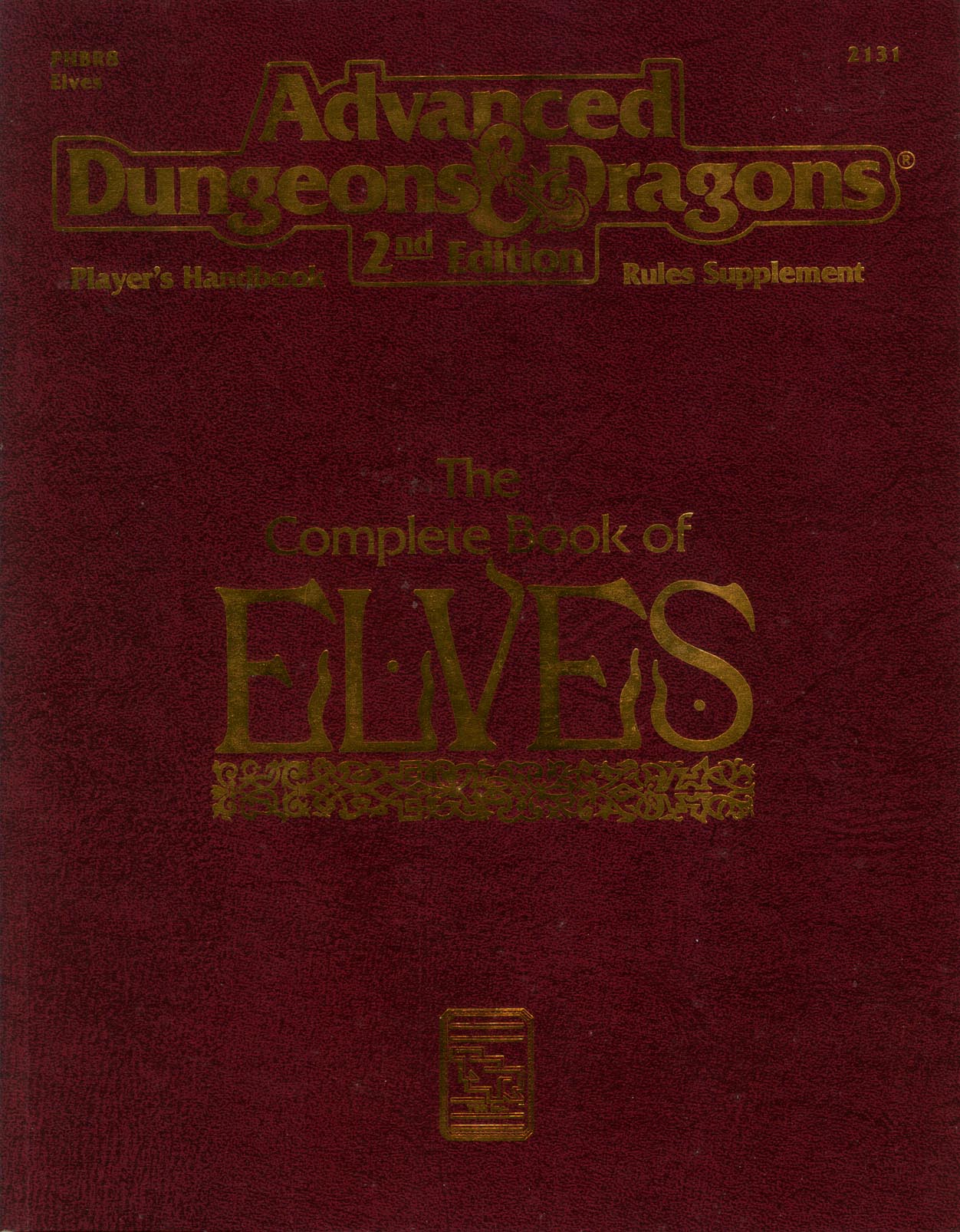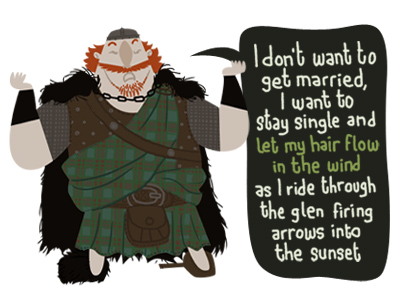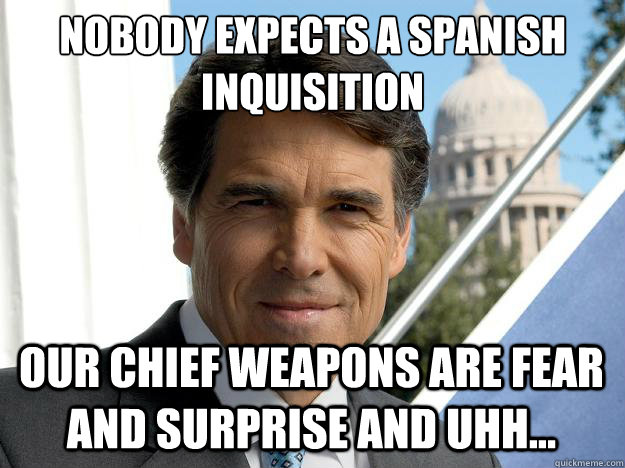Done.Ted the Flayer wrote:I request the 2e elf book.
The year is 1992, and there are a number of people who feel that Elves aren't Lord of the Rings enough in D&D. There was a time when it was considered completely normal for fans to have arguments about whether Elves should be merely as good at doing stuff as other mortal races, or if they should be much much better. Taking the side that Elves should be near-angelic ubermenschen was this book: The Complete Book of Elves.
The Complete Book of Elves was written by Colin McComb, a man who would go on to write on a number of books that were fairly well received. He did some work on Birthright and Planescape books that were pretty good, and his work in the computer industry is pretty decent. So we're definitely not saying that this book is written by someone who has no talent or is a generically terrible person. What we are saying is that this is his first book that he wrote right out of college (really), and it comes across as the excited ramblings of a newly promoted fanboy. Interestingly, the credits page gives special thanks to both Richard Baker and Steve Winter for their advice. Those guys kept their jobs with TSR and then WotC until fairly late in the 4th edition purges, and I genuinely don't know whether back in the early nineties they were advising their young apprentice to tone it down or to add more Elvish fapping. Literally no way to tell.
So let's grab ourselves some Dwarven Mead and start reading The Complete Book of Elves.

The introduction starts off with an italicized introduction that is written in character from the standpoint of an Elf who really wants you to know that Elves are better than you are. Not just a little bit better, and not just in one or two or three ways, but in every way. They also want you to understand that Dwarves may have told you something different, but that it is equally if not more important to know that Dwarves are hideous, jealous, lying douchebags. I don't know if it was intended for Elves to come off as pretentious assholes, but they totally do.
The second part of the introduction is not in character, except that it's still totally in character. It's the early nineties man, it is what it is. It's talking to the player of the game, rather than to a hypothetical person in the world, but it's still speaking from an in-character standpoint and warns you that some of the book's contents are lies and that extra double secret Elvish secrets are still going to remain secret.
Then there is another Introduction that takes things a bit more out of character to talk about the Elf in the AD&D® Game. Although even here it informs you that it is grievously insulting to Elves to treat them as if they were the same, because Elves are more different one to another than Humans are. Keep in mind that this is a game mechanics description for the benefit of players of a game, and that Elves are in fact not real. Again: early nineties, so pretentiousness like this in game books was pretty normal. We are assured that chapters 1-8 are about Elven Lore, while chapters 9-13 are about Elven Roleplaying. No, I don't have the slightest idea what the different between those is supposed to be when all the lore is roleplayed because it is a fucking RPG. We are assured a couple more times that any information given is under no circumstances to interfere with the special snowflakiness of any particular Elf, who are very specifically special snow flakes no matter what else is said about them.
Then we get another Introduction segment, this time to flog other books. The thrust of this, the fourth introduction, is that The Complete Book of Elves is actually part of a series of Complete books, and that your Elvish character is not just an Elf, but in fact an Elvish Fighter, an Elvish Thief, or (especially) an Elvish Wizard, and that therefore you could get some mileage out of having a book for your class in addition to a book for your race. This section also reminds us that while I and everyone I have ever met in my entire life called this series "The Completes Series", it was technically called the "PHBR Series". PHBR stood for "Player's Handbook Rules Supplement", and if you want to know why there is no "S" in "PHBR" I believe the answer is "Go Fuck Yourself". There is a little blurb on all 7 books in the series that had come out before it, which goes to point out that the DM may wish to keep the material in the Complete Book of Dwarves a secret from an Elf player because Elves and Dwarves do not exchange basic information, and reminds you that full Elves can't be Bards while Half Elves can, because it's 2nd edition AD&D and Fuck You.
We then get to the fifth Introduction, which is a note on House Rules, and how this is 2nd Edition AD&D so your DM almost certainly has some. This differs slightly from the usual DM-felating bullshit of this era, in that it stresses that while the DM is free to change the rules around, it should be done in a manner that is "fair". Also points out that players unhappy with ruling can and should talk to the DM about it. This is shockingly mature for 1992, although it still peppers it with bizarre aphorisms like "Remember, there are no right or wrong rules". Like fucking hell there aren't!
Anyway, the final Introduction before we get to the first chapter which primarily tells you that you should be using the 2nd edition AD&D rules, and points out that if you are attempting to use the first edition AD&D rules that the page numbers will be different. I know that you'd have to be a paste eater to be playing 1st edition AD&D in 1992, and that you'd have to regularly miss your mouth with the paste you're trying to eat if you were legitimately confused about how to go about using a 2nd Edition power creep book with a 1st edition PHB, but even in that light this seems excessively patronizing to the reader. Of more import is the admonition to use the proficiencies system. See, back when the 2nd Edition AD&D PHB came out, the proficiencies were an optional rule, and just one of several optional rules for defining how character abilities worked. With expansion material, they became less and less "optional", as they were one of the only parts of the basic game that expansion material could latch onto. So by 1992, you were using Proficiencies. But the book still felt that it had to apologize for that fact, because it hadn't been true for very long. And finally, the author says that they are going to switch back and forth between male and female pronouns without warning "since elves make no distinction between male and female". This line has launched more Elf Gay Jokes than anything else that anyone has ever said or done in the history of anything.
Yes, it really says that at the end of Introduction 6The Complete Book of Elves wrote:But, come: The elves are waiting.
Chapter 1: The Creation of Elves
The first actual chapter of the book has to do with Elven creation myths. Because that's the most boring and irrelevant possible thing to talk about with regards to a fantasy race, so we're leading with that. It starts with an in-character italicized rant from a holy book of Corellon Larethian. It's a bit aout how Elves were created before all the other races, and also how all the races are less beautiful than Elves. We take a small break for the author to explain to you that Elvish creation myths are truer than other creation myths because Elves live a long as time and they have only had handreds of generations since the beginning of the universe unlike other sad sack races who have had like millions. Then we get right back into the in-character religious tirades, and we are assured that the Elf giving us this infodump is none other than Larian Songshine, whose name I assure the gentle reader I am not making up.
The in-character chunk is a thing about the war between Corellon Larethian and Gruumsh. "The Godswar" it is called, as if that was the only war between gods in D&D. But what's interesting about that is not the actual story, because honestly about nothing in the whole D&D mythos is more boring than the story of how Corellon Larethian cut the eye out Gruumsh. No, the interesting thing is that right after doing that the book descends back into what is nominally out-of-character and non-italicized text, and in doing so it gives what is possibly the most perfectly inane piece of self-important fappery of the era. The next paragraph is so over-the-top that I can't even describe it, i'll just print it word for word:
That is out of character.The Complete Book of Elves wrote:The tale of the Godswar explains some of the elven traits, both physical and mental. Being formed of the blood of the god Corellon Larethian accounts for why elves possess such long lifespans. Tears from the moon provide a rationale for the elves' ethereal beauty—a beauty that often led the lesser races to think of elves as gods. The soil of the earth explains the connection all elves feel with the land.
Having talked of the Godswar, they then go on to talk about the Elfwar.That's the war between the Drow and the rest of the Elves. This book nixes the old Gygaxian idea that Drow have Black Skin because they live underground, but eagerly embraces the idea that Drow have Black Skin because they have been cursed by Corellon Larethian for their treachery. Remember kids: don't trust Black people because they have the Mark of Cain. Apparently, after the Drow left Arvandor to go through an interdimensional rift that took them to the lair of the Spider Queen which is in the Abyss but also under ground and everyone else "stayed" in Arvandor (yes, that part doesn't make any sense, I'm legitimately unclear as to how Elves ended up on the Material Plane of Existence in this narrative), the remaining Elves underwent something called "The Fractioning". During this period, Elves went off into different areas and some of them grew gills and others grew wings because they were appalled and discontented that some Elves had betrayed them by murdering people for no apparent reason in the name of the Spider Queen. That doesn't make any sense either. Fuck.
The nominally out-of-character portion continues to the end of the chapter, where it starts talking about Elves and Humans. The pretentiousness and incoherence of this chapter continues.
The Complete Book of Elves wrote:The first elven contact with humans has been lost to the mists of time. Since the elves were figures out of human myth, the humans were more inclined to hold them in awe. This attitude has carried over even unto the present day, and the elves remain enigmas to humans.

How could the Elves be myths before first contact? What the fuck? Did Humans have myths that were Elf-like that the Elves exploited? Did the Elves and Humans have an earlier first contact, a hiatus, and then another first contact after the earlier first contact had long faded into myth and legend? I don't fucking know.
It then goes on to make a Lord of the Rings reference, to inform you that Elves don't trust Humans and many of them have said "You know what? Fuck this, I'm going home." and then picked up and left for "The Elflands". That's a place that is totally awesome that you can't go to unless you're an Elf. And Elves go there when they have tired of the World of Men. Because Tolkien.
The chapter ends with a mini-tirade about how Elves are afraid of Humans because Humans breed quickly and cause environmental damage. Because Tolkien. Also because it's the early 90s and RPG books had to have hamhanded environmental messages.
Next Up: Chapter 2: Variations on a Theme
That is what the chapter is actually called.
-Username17





